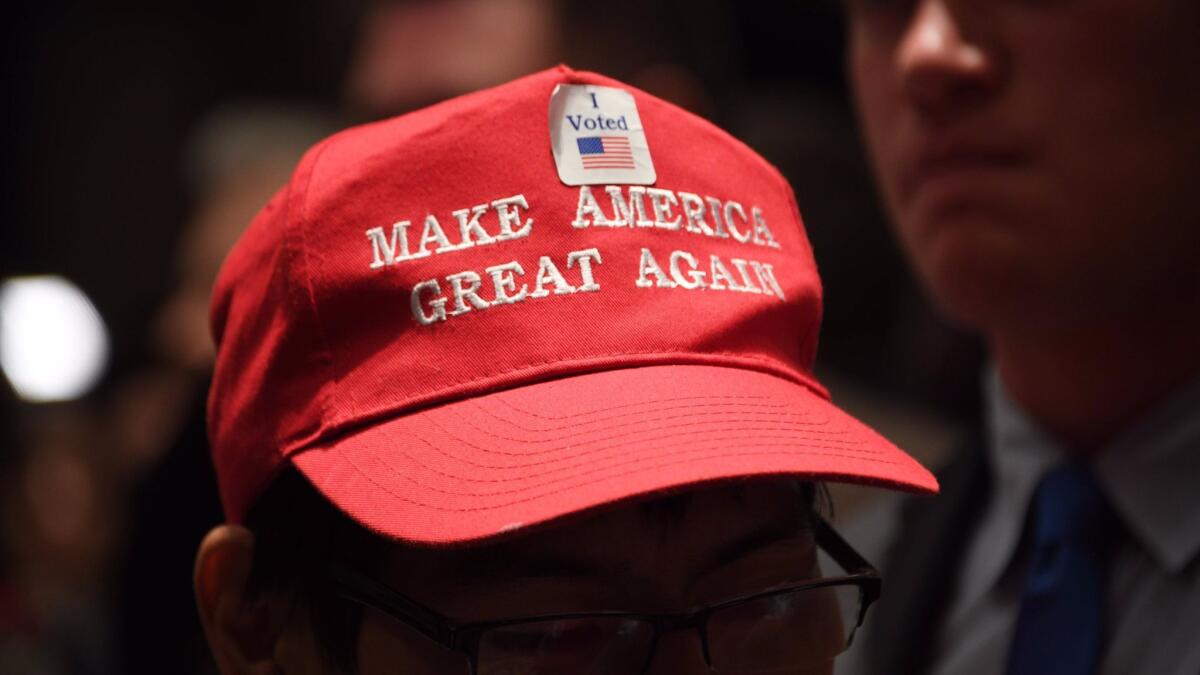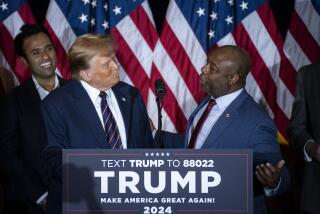Editorial: Is Roy Moore’s defeat the beginning of the end of Trumpism? Probably not

The outcome of the U.S. Senate race in Alabama is a source of both encouragement and dismay. The good news, of course, is that Democrat Doug Jones, an out-of-nowhere former prosecutor, beat former Republican state Chief Justice Roy Moore in an election that hung on issues of character. Moore’s character, to be specific, following credible allegations that he had, while in his 30s, sought relationships with much younger women, many of whom he met while trolling a local shopping mall. Two women alleged he had forced sexual contact with them, one when she was only 14. Apparently that was too much, even for many of Alabama’s deeply conservative Republican voters.
The bad news is that Moore still won 48.4% of the vote. Yes, nearly half of Alabama voters — including the vast majority of Republicans who voted — decided that they preferred a scandal-scarred, race-baiting, Bible-thumping moralist who was twice kicked off the state bench for defying federal court orders to a pro-gun Democrat who, as a U.S. attorney, convicted two of the surviving Klansmen responsible for the infamous 1963 16th Street Baptist church firebombing that killed four young African American girls.
Ignorance, self-dealing, distrust of democratic institutions, know-nothingism and racism remain dangerously potent forces in American politics.
Hopeful Americans will accept the result as a possible turning point in this ugly moment in American politics, (including, perhaps, as a sign of the possible political demise of “economic nationalist” and Trump whisperer Steve Bannon, who campaigned for Moore). Dare we hope this also means the nation has seen peak Trumpism? That the reduction of the Republican majority in the Senate will make it more difficult for the president and his allies to push their dangerous agenda through Congress? That there might even be a path for Democrats to recapture the Senate from a Trump-obeisant GOP in 2018?
This is the third election in which President Trump endorsed a candidate, and it is his third loss. He backed Ed Gillespie in last month’s Virginia governor’s race (won by Democrat Ralph Northam), and he supported Luther Strange, the man Jones will replace in the Senate, in the GOP primary before supporting Moore. (The seat became open after Trump made Jeff Sessions his attorney general). That Trump, himself the target of a number of sexual abuse allegations, backed Moore added a sleazy “birds of a feather” undercurrent to the race waged against the backdrop of a burgeoning #MeToo movement.
How much of a role the backlash against sexual misconduct played in the result is unclear (54% of voters said it was not a factor in their vote; those for whom it was a factor generally backed Jones). Exit polls found that Jones won 30% of the white vote, more than previous Democrats have won in statewide races, and that he was propelled by college-educated white women with children at home, just the kind of voters who might be extra sensitive to the idea of a creepy man hitting on their daughters at the food court.
Jones also won 96% of the African American vote, on par with past support for Barack Obama, and driven by an intensive local get-out-the-vote effort by African American organizations. And Jones won by nine percentage points among independents (21% of the vote), a bloc that overwhelmingly backed Republicans in 2008 and 2012. Combined, that was sufficient to overcome Moore’s base. Moore received 68% of the vote among white conservatives, evangelicals, those with no college education, men, and older voters — a coalition that had been a sure bet for Alabama Republican candidates for more than a quarter-century.
Yet the overall turnout was less 40%, high for a one-off special election, but still a disturbing measure of our national political disconnect. That more than half of Alabama voters couldn’t be stirred to take part in such a pivotal election at such a critical moment in our history spotlights the disaffection so many Americans continue to feel for the electoral system. As Trump’s win and Moore’s near-win show, a large portion of the country either doesn’t care about how our government is run or by whom (signaled by not voting), or are willing and eager to send to Washington people who want demolish to the institutions that already exist.
But credit is due to those who voted, and especially to the Republicans and conservatives who broke the tribal bonds Tuesday and either voted for the Democrat, or wrote in someone else’s name in their ballots (an unusually high 1.7% of the vote went to write-ins) rather than support Moore and the president who backed him.
Ignorance, self-dealing, distrust of democratic institutions, know-nothingism and racism remain dangerously potent forces in American politics. More reasoned voices need to make themselves heard over the next two election cycles to wrest control of Congress from the current batch of cynical Trump enablers. Today’s Republican Party has proved itself to be too craven, irresponsible and self-serving to be trusted with the reins of power. Let’s hope the spurning of Moore begins that change.
Follow the Opinion section on Twitter @latimesopinion or Facebook.
UPDATES:
4 p.m.: This editorial was updated with more complete figures on voter turnout in Alabama.
This editorial was originally published at 9:20 a.m.
More to Read
A cure for the common opinion
Get thought-provoking perspectives with our weekly newsletter.
You may occasionally receive promotional content from the Los Angeles Times.






